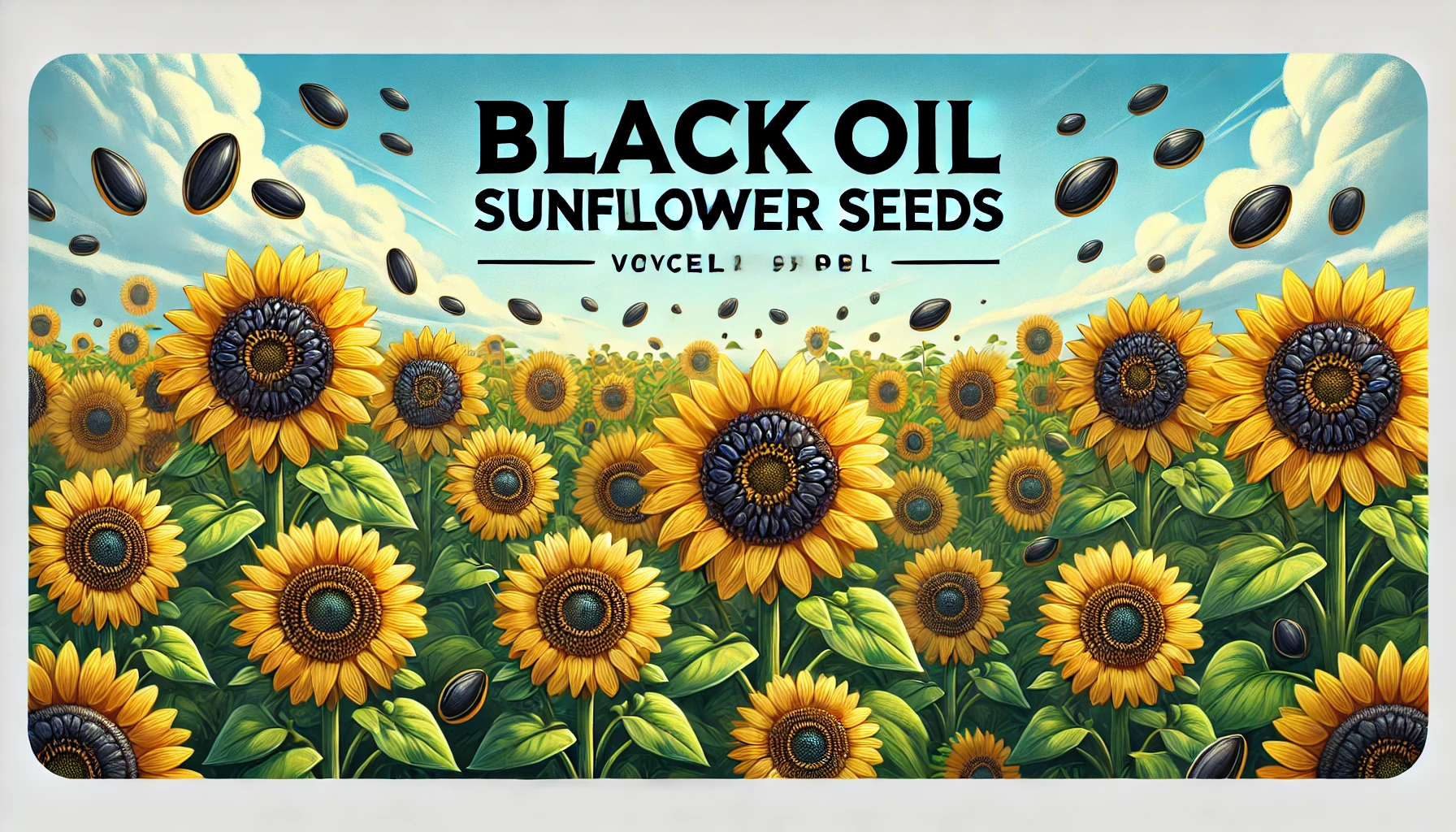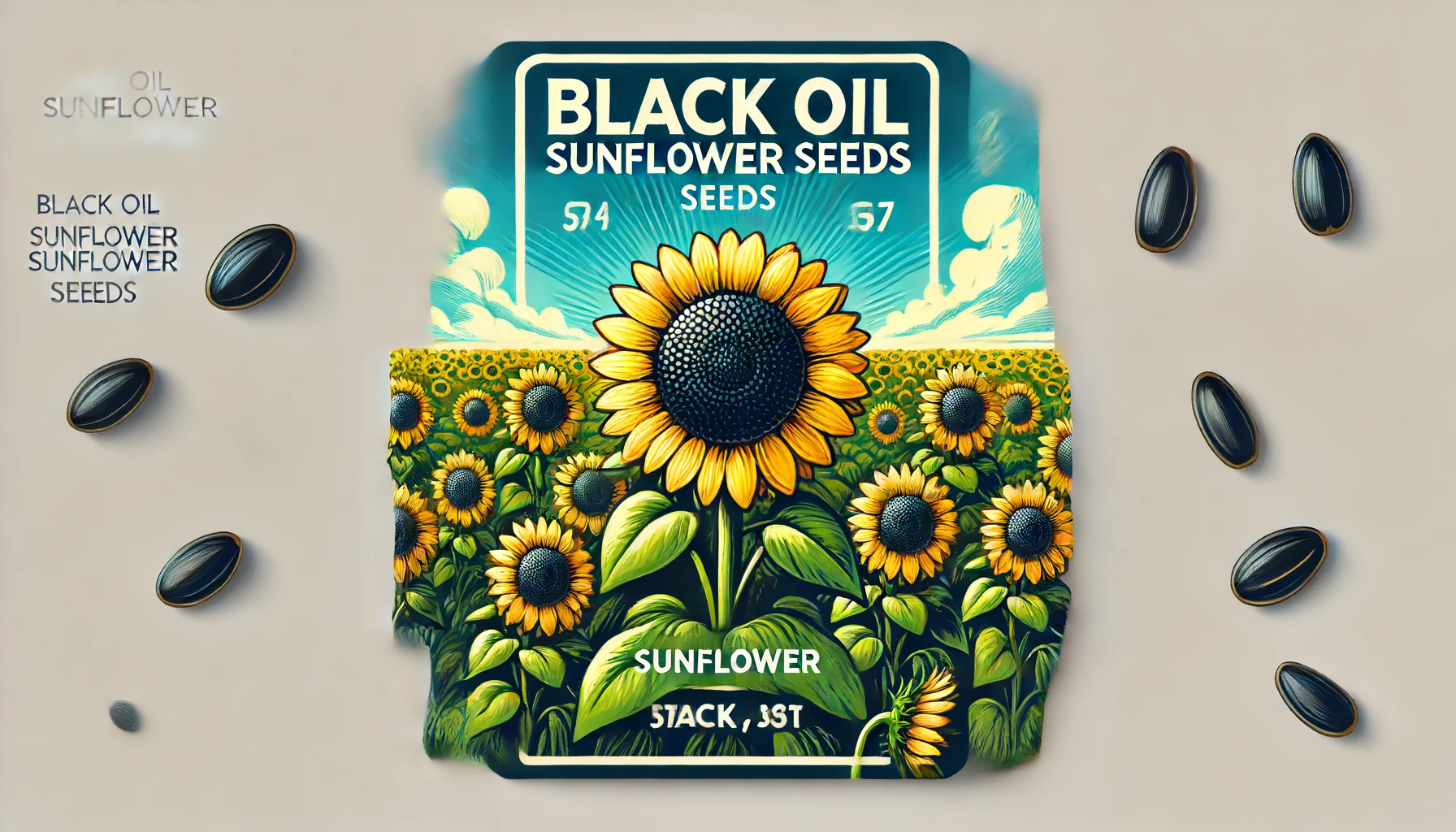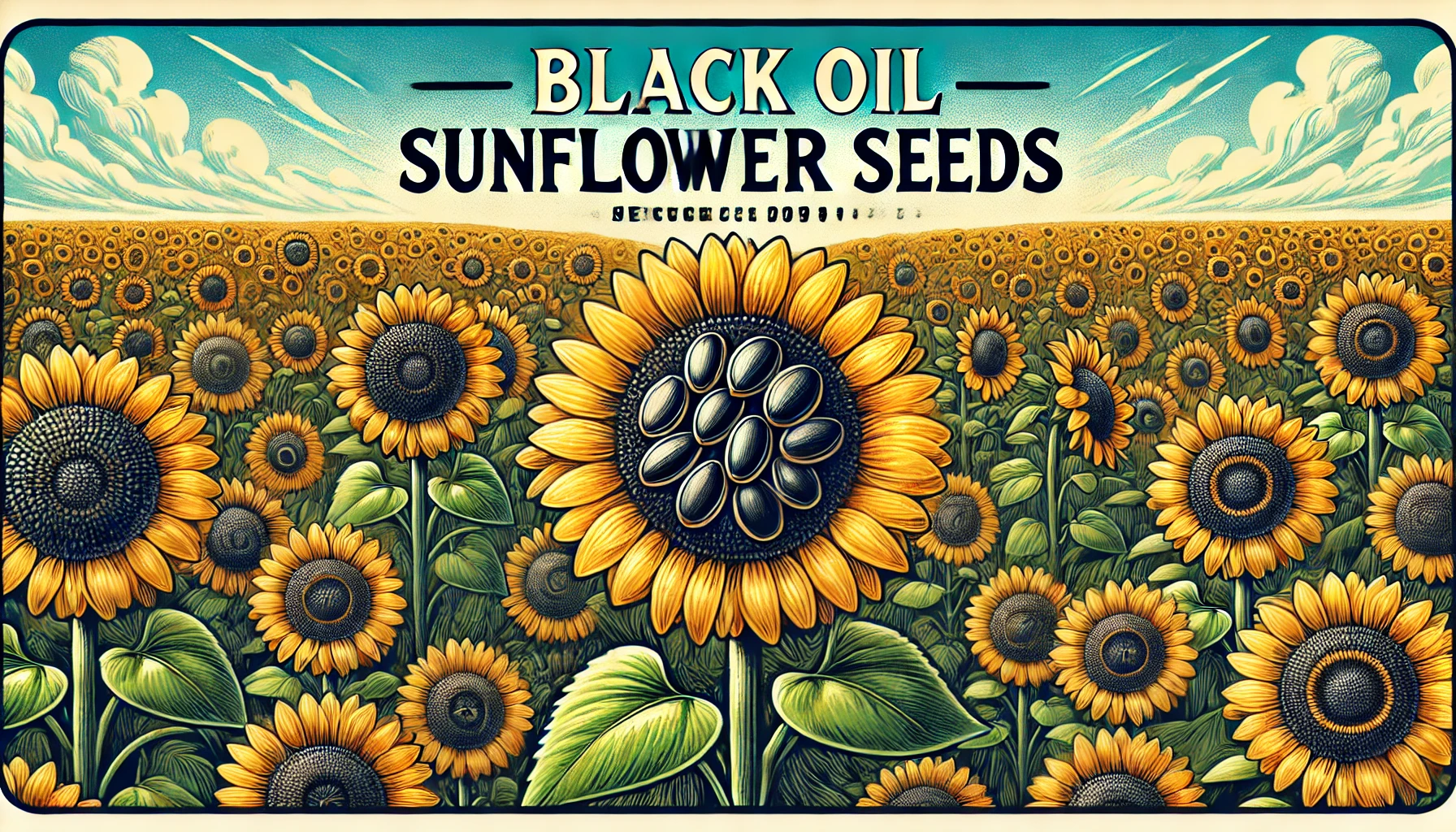Table of Contents
ToggleBlack Oil Sunflower Seeds
What are Black Oil Sunflower Seeds?
Black oil sunflower seeds are small, black, and rich in oil, making them a popular choice for bird feed and oil extraction. Unlike their striped counterparts, these seeds have thinner shells, making them easier for birds and other wildlife to consume. The seeds come from the sunflower plant (Helianthus annuus), which is known for its bright yellow petals and large, round flower heads.
Benefits of Black Oil Sunflower Seeds
Black oil sunflower seeds offer a wide range of benefits. They are not only nutritious for human consumption but also highly beneficial for birds and wildlife. These seeds provide essential nutrients and energy, especially during cold months and migration periods for birds. Additionally, sunflower plants contribute positively to the environment by improving soil health and supporting biodiversity.
Dietary Profile of Black Oil Sunflower Seeds
A dietary profile provides a detailed overview of the nutritional composition and health benefits of a food item. For black oil sunflower seeds, this profile highlights the key nutrients they contain and explains how these contribute to overall health and wellness.
Nutritional Composition per 100 Grams
| Nutrient | Amount |
|---|---|
| Calories | 584 kcal |
| Total Fat | 51.5 g |
| Saturated Fat | 4.5 g |
| Monounsaturated Fat | 9.5 g |
| Polyunsaturated Fat | 35.5 g |
| Protein | 20.0 g |
| Carbohydrates | 20.0 g |
| Fiber | 8.6 g |
| Sugars | 2.6 g |
| Vitamin E | 35.17 mg (176% DV) |
| Thiamine (B1) | 1.48 mg (123% DV) |
| Riboflavin (B2) | 0.25 mg (19% DV) |
| Niacin (B3) | 8.33 mg (52% DV) |
| Vitamin B6 | 1.34 mg (103% DV) |
| Folate (B9) | 227 mcg (57% DV) |
| Magnesium | 325 mg (81% DV) |
| Phosphorus | 660 mg (94% DV) |
Key Nutrients and Health Benefits
Healthy Fats
Polyunsaturated and Monounsaturated Fats: These fats are crucial for heart health. They help lower bad cholesterol levels (LDL) and increase good cholesterol levels (HDL), reducing the risk of cardiovascular diseases.
Protein
Muscle Repair and Growth: With 20 grams of protein per 100 grams, black oil sunflower seeds are an excellent source of plant-based protein, essential for muscle repair, growth, and overall body function.
Dietary Fiber
Digestive Health: The fiber content aids in digestion, prevents constipation, and helps maintain a healthy gut. It likewise adds to a sensation of completion, that can assist in weighing the board.
Vitamins
Vitamin E: A powerful antioxidant that protects cells from oxidative damage, supports skin health, and boosts the immune system.
B Vitamins (Thiamine, Riboflavin, Niacin, Vitamin B6, Folate): These vitamins are essential for energy metabolism, brain function, and red blood cell production.

Which birds prefer to eat black sunflower
Birds that prefer to eat black oil sunflower seeds include:
- Northern Cardinals
- Chickadees
- Finches
- Sparrows
- Nuthatches
- Grosbeaks
- Titmice
- Woodpeckers
- Blue Jays
- Doves
Benefits of Black Oil Sunflower Seeds
Health Benefits
Black oil sunflower seeds are a nutritional powerhouse. Their high content of healthy fats, particularly polyunsaturated and monounsaturated fats, supports cardiovascular health by helping to reduce bad cholesterol levels. Vitamin E, a potent antioxidant found abundantly in these seeds, helps protect cells from damage, promoting overall health and reducing the risk of chronic diseases. Additionally, the seeds are a good source of protein and dietary fiber, aiding in muscle repair, growth, and digestive health.
What is Important for a Bird and a Plant?
For birds, black oil sunflower seeds are an excellent energy source, especially during times of migration or harsh weather. The seeds’ high oil content provides the necessary calories that birds need to maintain their energy levels. Furthermore, the thin shells make it easier for small birds to consume these seeds without expending too much energy.
For plants, sunflowers play a crucial role in the ecosystem. They are known for their ability to improve soil health by adding organic matter and aiding in soil structure. Sunflowers also attract pollinators such as bees and butterflies, which are essential for the reproduction of many plant species. Additionally, sunflowers can be used in phytoremediation to clean contaminated soils, demonstrating their environmental benefits.
Environmental Benefits
Black oil sunflower seeds are not only beneficial for birds and humans but also for the environment. Sunflower plants are known to enhance soil quality by contributing organic matter and promoting a healthy soil structure. They also help in the process of phytoremediation, where they absorb toxins and heavy metals from the soil, thus cleaning contaminated lands. Moreover, sunflowers attract various pollinators, such as bees and butterflies, which are crucial for maintaining biodiversity and the health of ecosystems.
Uses of Black Oil Sunflower Seeds
Human Consumption
Black oil sunflower seeds, while primarily known for their use in bird feed, are also consumed by humans. These seeds can be delighted in different methodologies:
- Roasted and Salted: Black oil sunflower seeds can be roasted and salted for a tasty and nutritious snack. Roasting enhances the flavor and makes the seeds crunchy, making them a popular choice for healthy snacking.
- Baking and Cooking: The seeds can be added to bread, muffins, and other baked goods to boost their nutritional content. They can also be sprinkled on salads, yogurt, or oatmeal for added texture and nutrients.
- Sunflower Seed Butter: Similar to peanut butter, sunflower seed butter is made by grinding the seeds into a smooth paste. This is a great alternative for those with nut allergies and is rich in healthy fats and proteins.
- Oil Extraction: The high oil content in black oil sunflower seeds makes them suitable for oil extraction. Sunflower oil is commonly used in cooking and salad dressings due to its light flavor and high smoke point.

Bird Feed
One of the most significant uses of black oil sunflower seeds is in bird feed. These seeds are highly favored by bird enthusiasts for several reasons:
- Energy Source: The high oil content provides birds with the necessary energy, especially during migration and cold weather. This makes black oil sunflower seeds an essential part of bird feed mixes.
- Attraction of Various Species: These seeds attract a wide variety of bird species, including finches, chickadees, cardinals, and woodpeckers. Bird watchers often use black oil sunflower seeds to draw different birds to their feeders.
- Ease of Consumption: The thin shells of black oil sunflower seeds make them easy for birds to crack open and consume. This reduces the energy birds need to expend while eating, making it an efficient food source.
- Nutritional Benefits: Besides providing energy, these seeds offer essential nutrients like proteins, fats, and vitamins, which are crucial for the overall health and well-being of birds.
How to Grow Black Oil Sunflower Seeds
Growing black oil sunflower seeds can be a fulfilling endeavor, providing you with vibrant flowers and nutritious seeds. Follow this guide to successfully plant, care for, and harvest black oil sunflowers.
Planting Guide
1. Choose the Right Location
- Sunlight: Sunflowers thrive in full sun, needing at least 6-8 hours of direct sunlight daily.
- Soil: Opt for well-draining soil with a pH between 6.0 and 7.5. Sunflowers prefer loamy soil but can adapt to different soil types, as long as it is not waterlogged.
2. Prepare the Soil
- Tilling: Loosen the top 12-15 inches of soil to ensure good root penetration.
- Organic Matter: Add compost or well-rotted manure to enhance soil fertility and structure.
3. Plant the Seeds
- Timing: Plant seeds in late spring after the last frost, once the soil temperature reaches at least 50°F (10°C).
- Spacing: Sow seeds about 1 inch deep and 6 inches apart. For multiple rows, space rows 2-3 feet apart to allow for ample sunlight and air circulation.
- Watering: Water the seeds immediately after planting to ensure good soil contact and initiate germination.

Care and Maintenance
1. Watering
- Standard Watering: Keep the dirt persistently wet but not waterlogged. Sunflowers need about 1 inch of water per week, especially during dry spells.
- Deep Watering: Water deeply to encourage strong root development, particularly as the plants grow taller.
2. Fertilizing
- Initial Fertilization: Apply a balanced fertilizer at planting. Sunflowers benefit from nitrogen for growth, phosphorus for root development, and potassium for flower and seed production.
- Ongoing Fertilization: Side-dress with a balanced fertilizer or compost once or twice during the growing season, especially if the plants appear to need a nutrient boost.
3. Supporting the Plants
- Marking: Tall sunflower assortments may moreover require marking to keep them from bringing down in durable breezes. Use sturdy stakes and soft ties to avoid damaging the stems.
- Mulching: Apply a layer of mulch across the foundation of the blossoms to keep up with soil dampness, smother weeds, and direct soil temperature.
4. Pest and Disease Management
- Pests: Monitor for common pests such as aphids, caterpillars, and sunflower beetles. Utilize insecticidal cleaning cleanser or neem oil to control pervasions.
- Infections: Forestall contagious sicknesses by utilizing ensuring great air dissemination and warding off above watering. Eliminate any aroused vegetation to save you from the spread of illness.
Harvesting
1. Timing the Harvest
- Maturity of Flower Heads: Harvest sunflower seeds when the back of the flower heads turn yellow or brown, and the seeds become plump and start to loosen. The petals will have dried and fallen off.
- Weather Considerations: Choose a dry, sunny day for harvesting to reduce the risk of mold and mildew on the seeds.
2. Harvesting the Seeds
- Cutting the Heads: Use a sharp knife or pruning shears to cut the flower heads, leaving about 12-18 inches of stem attached.
- Drying the Heads: Hang the flower heads upside down in a warm, dry, and well-ventilated area for a few weeks to ensure they dry thoroughly.
- Removing the Seeds: Once the flower heads are completely dry, rub the heads to dislodge the seeds. This can be done by hand or by gently brushing the heads with a stiff brush.
3. Storing the Seeds
- Cleaning the Seeds: Remove any remaining plant debris from the seeds.
- Storage Conditions: Store seeds in an airtight container in a cool, dry place. Properly stored seeds can last for several months.

Growth Stages of Black Oil Sunflower Seeds
Understanding the growth stages of black oil sunflower seeds is crucial for successful cultivation. Here is a nitty gritty outline of every degree:
1. Germination
Time Frame: 7-10 days
Description: The germination stage begins when the seed absorbs water, swelling and breaking through its outer shell. The radicle (young root) emerges first, anchoring the plant into the soil. Following this, the hypocotyl (young shoot) pushes upwards towards the light. Optimal conditions for germination include warm soil temperatures (70-85°F) and consistent moisture.
2. Seedling Stage
Time Frame: 2-3 weeks
Description: During the seedling stage, the young plant develops its first true leaves. These leaves are larger and more defined compared to the initial cotyledons (seed leaves). At this stage, the sunflower plant requires adequate sunlight, water, and nutrients to support its rapid growth. It’s essential to protect seedlings from pests and diseases, ensuring they have a strong start.
3. Vegetative Growth
Time Frame: 4-8 weeks
Description: The vegetative growth stage is marked by rapid stem elongation and leaf development. The plant focuses on building a robust structure to support the future flower head. Regular watering and nutrient supply are crucial during this stage to promote healthy growth. The sunflower’s height and leaf size will significantly increase during this period.
4. Budding Stage
Time Frame: 1-2 weeks
Description: The budding stage is when the flower bud begins to form at the top of the stem. The bud initially appears as a small, green bump and gradually enlarges. This stage requires continued support in terms of water and nutrients, particularly phosphorus and potassium, to facilitate flower development.
5. Flowering
Time Frame: 2-3 weeks
Description: The flowering stage is characterized by the opening of the flower bud, revealing the sunflower’s iconic yellow petals and central disk. This stage is crucial for pollination. Bees and other pollinators play a significant role in fertilizing the flowers, leading to seed development. The sunflower should receive ample sunlight and water to support the blooming process.
6. Seed Development
Time Frame: 4-6 weeks
Description: After pollination, the flower begins to wilt, and seeds start to form within the central disk. The seeds gradually mature, filling out and hardening. The back of the flower head will turn from green to yellow, then brown, indicating the seeds are ripening. During this stage, it’s essential to reduce watering to prevent mold and mildew.
Conclusion
The dietary profile of black oil sunflower seeds reveals a nutrient-dense food that offers numerous health benefits. Incorporating these seeds into your diet can contribute to improved heart health, enhanced immune function, better digestion, and overall well-being. Whether consumed as a snack, added to meals, or used in bird feed, black oil sunflower seeds are a versatile and valuable addition to both human and animal diets.
FAQs About Black Oil Sunflower Seeds
Q1. What are the nutritional benefits of black oil sunflower seeds?
A: Black oil sunflower seeds are rich in healthy fats, vitamin E, B vitamins, magnesium, selenium, protein, and dietary fiber. They support cardiovascular health, provide antioxidants, aid digestion, and promote skin health.
Q2. Are black oil sunflower seeds safe for human consumption?
A: Yes, black oil sunflower seeds are safe for human consumption when properly processed. They can be roasted and eaten as a snack or used in various recipes. However, seeds intended for human consumption undergo specific processing to ensure safety.
Q3. How do black oil sunflower seeds benefit birds?
A: Black oil sunflower seeds provide birds with high-energy food, especially during migration and winter. The thin shells make them easy to eat, and their high oil content offers essential nutrients.
Q4. Can I grow black oil sunflower seeds at home?
A: Yes, black oil sunflower seeds can be grown at home. They require a bright area, pleasantly depleted soil, and common watering. With minimal maintenance, you can enjoy growing these beneficial plants in your garden.
Q5. What are the environmental benefits of planting sunflowers?
A: Sunflowers improve soil health, support biodiversity by attracting pollinators, and can be used in phytoremediation to clean contaminated soils. They also add beauty to gardens and landscapes.

1 thought on “Black Oil Sunflower Seeds: Top 7 Benefits and Uses”